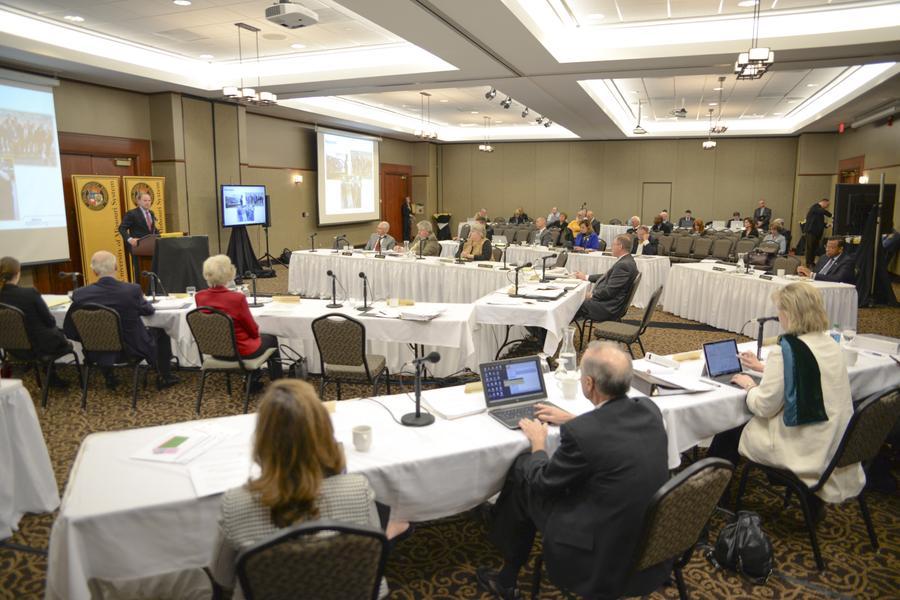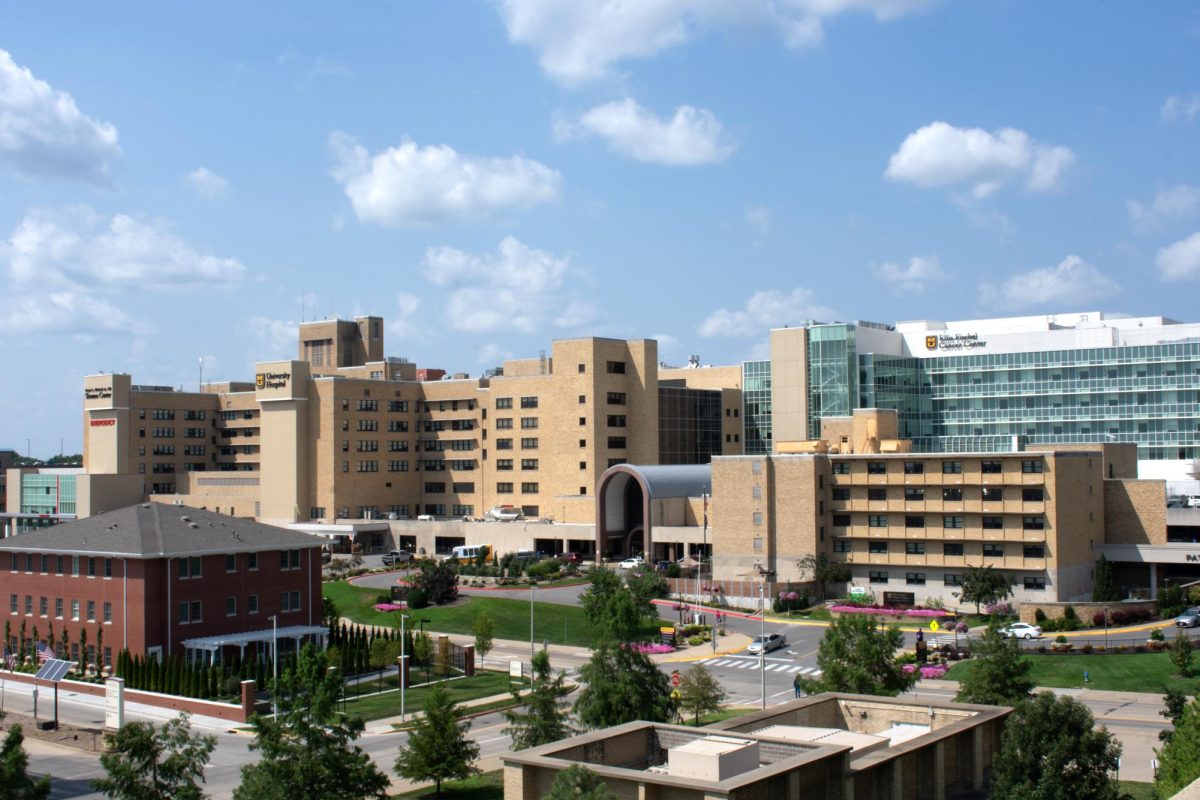Tuition increases and new Title IX procedures were two of the several topics discussed at the UM System Board of Curators’ meeting at MU on Thursday.
####Tuition and fees
[Tuition increases were approved in a 6-1 vote and will take effect in summer 2014. Curators also unanimously approved several supplemental fee increases for schools like the Sinclair School of Nursing](https://www.themaneater.com/stories/2015/2/5/tuition-fees-increase-system-wide/).
Nonresident undergraduates at MU will see their tuition increase by $23.20 per credit hour, a 3 percent increase that will result in an annual tuition of $23,247.
Resident undergraduates’ tuition will increase by 0.8 percent, which is on par with the rising CPI. The CPI change was initially estimated to be 1.8 percent in December. Wolfe said the decreasing cost of gasoline has helped bring down the CPI rate.
The tuition increases were proposed to keep up with the rising consumer price index, UM System President Tim Wolfe said.
John Phillips, the curator from Kansas City, criticized the state for depreciating higher education. He said legislators’ lack of interest in higher education has put the UM System “in a box”.
“We’re getting away from (higher education),” said Phillips. “We are now more private than we are public, and that’s not American.”
####Title IX
[New regulations to handle discrimination complaints](https://www.themaneater.com/stories/2015/2/5/curators-approve-title-ix-procedures-amendments/) against UM System faculty and staff members were approved unanimously by the curators.
Wolfe presented a report on the state of Title IX issues in the UM System. He said the system is working toward its goal of changing campus culture and becoming a national model for Title IX.
The system plans to conduct a climate survey of all students in the future to evaluate their perceptions and prevalence of sexual misconduct, as well as perceptions of the university’s response and overall culture towards sexual misconduct, Wolfe said.
“We owe it to students to have a safe and secure environment where sexual harassment and assault will not be tolerated,” he said. “It’s my responsibility to continue to challenge and ensure progress towards our goal of becoming a national example and moving the needle from good to great.”
####Softball stadium greenlit
The construction of a new $16-million softball stadium was approved by the Board of Curators in a unanimous vote.
The new field will be erected in what is now the northwest corner of the Hearnes Center parking lot. Wolfe said workers will have to raze an estimated 535 parking spaces in order to make room for the new field. Part of the approved plan includes the construction of a new parking lot south of Champions Drive and along Providence Point Drive.
National Collegiate Athletic Association regulations call for the extension of softball fields’ fences to 230 feet in center field. Wolfe said if that were done at the Tigers’ current home, University Field, workers would have to build onto the adjacent street.
The new stadium will have a capacity of 1,800 people, three times larger than University Field’s capacity of 600.
According to proposal documents, $13.5 million of the project funds will come from private gifts. An additional $2.5 million is funded by a 2012-approved debt financing plan.
Lempka Edison Architects, a firm based in Lenexa, Kansas, will supervise the project.
####Financial aid
Hank Foley, UM System executive vice president for academic affairs, presented [a report on financial aid trends in the UM System](https://board.um.umsystem.edu/February%2056%202015%20Board%20of%20Curators%20Meeting/Academic,%20Student%20and%20External%20Affairs/03%20ASEA%20Info%201-1%20Financial%20Aid%20Report%20Feb%202015.pdf) to the curators.
Foley said data shows enrollment at MU is continually increasing and students with financial aid continue to receive access to the university.
According to the report, lower-income undergraduates have the largest amount of unmet financial need and the greatest student loans, despite having received the largest grant and aid awards.
The budgeted cost of attendance for resident undergraduates at MU for fiscal year 2014 was $23,310, according to the report. The average grant or scholarship aid was $4,863, leaving a gap of $18,447.
The report showed that loans comprise 51 percent of financial aid in Missouri, with grants accounting for 41 percent and employment making up eight percent.
Foley said MU has increased its representation of both under-represented and low-income students from FY2008 to FY2013. Minority students represented nearly 20 percent of MU students in 2013, an increase of more than five percent since 2008.
####Growth in online learning
Foley presented an update on the UM System’s growing eLearning program. He said online classes enable the university to educate the same amount of students with fewer faculty members, which gives faculty availability to teach electives and develop new courses.
“Our focus has always remained on the students and their learning, even as we’ve learned to utilize exciting new technology,” he said.
Foley said credit hours earned from online-only classes at MU increased by 66.8 percent from fiscal year 2012 to 2014, and increased by 38.5 percent for the entire system.
“Today, we’re somewhere between the traditional university and the technology-extended mix of physical and virtual university in the future,” he said. “We have to embrace this. It’s coming and it will change the way things are done.”
Foley also named intercampus online courses a new method of collaboration between campuses. He said the UM System recently added 34 new online intercampus courses.
“It’s an exciting time with lots of innovation going on, but educators are only at the beginning of this paradigm shift in Missouri and around the world,” he said.
####Curators’ dinner
The first day of the Board of Curators meeting drew to a close as board members, faculty, and student leaders convened in the lower lounge of the Student Center for a reception and dinner.
Chancellor R. Bowen Loftin gave an introductory speech before turning the podium over to Missouri Students Association President Payton Head.
The primary focus of Head’s speech was to congratulate board members and faculty for all the work they have done to help students in the past year.
Head closed his remarks with a challenge for the administrators, who had [proclaimed in December that 2015 was to be the “year of the student.”](https://www.themaneater.com/stories/2014/12/12/curators-discuss-university-leadership-alternative/)
“Let’s make every year the year of the student,” he said.














